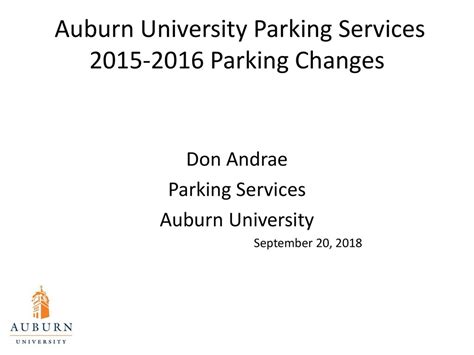Navigating the expansive campus of Auburn University can be a daunting task, especially when it comes to finding a parking spot. With over 30,000 students, faculty, and staff vying for limited parking spaces, it’s essential to have a solid understanding of the parking landscape. This comprehensive guide will equip you with all the necessary information to secure a parking spot and avoid the dreaded campus parking woes.

Parking Permits
Auburn University strictly enforces parking regulations, requiring all vehicles on campus to display a valid parking permit. Permits are available in various types, each with its own designated parking areas:
Student Permits
- Commuter Permit: Allows students to park in designated commuter lots.
- Resident Permit: Permits students residing on campus to park in resident halls and designated resident parking lots.
- Premium Permit: Provides students with access to select premium parking areas closer to academic buildings.
Faculty/Staff Permits
- Faculty/Staff Permit: Allows faculty and staff to park in designated faculty/staff parking lots.
- Reserved Permit: Assigns a specific parking space to faculty or staff members with job-related needs.
Visitor Permits
- Visitor Permit: Allows visitors to campus to park in designated visitor parking areas for a limited duration.
Parking Availability
The availability of parking spaces on campus varies throughout the day and week. Campus traffic is typically heaviest during morning and afternoon class hours, making it crucial to arrive early to secure a spot. The following tips can help you improve your chances of finding a parking space:
- Utilize the Parking Map: Access the university’s interactive parking map to identify available parking spaces in real-time.
- Consider Off-Campus Parking: Explore parking options in nearby residential areas or commercial parking lots adjacent to campus.
- Ride-Sharing or Public Transportation: Consider carpooling with classmates or utilizing Auburn’s Tiger Transit bus system to reduce the number of vehicles on campus.
Parking Zones and Regulations
To maintain order and ensure fair parking distribution, Auburn University has established several designated parking zones:
Zone A: Premium Parking
- Restricted to vehicles with premium parking permits.
- Located in prime areas near academic buildings and popular destinations.
Zone B: Residence Halls
- Reserved for vehicles with resident permits.
- Typically located adjacent to on-campus housing.
Zone C: Faculty/Staff Parking
- Designated for vehicles with faculty/staff permits.
- Located in close proximity to offices and research facilities.
Zone D: Commuter Parking
- Available for vehicles with commuter permits.
- Located on the outskirts of campus, requiring a shuttle or walk to academic buildings.
Zone V: Visitor Parking
- Restricted to vehicles with visitor permits.
- Limited availability, especially during peak hours.
Parking Enforcement
Auburn University Parking Services actively enforces parking regulations on campus. Failure to display a valid permit, parking in unauthorized areas, or overstaying the time limit may result in fines or towing. To avoid costly penalties, adhere to the following guidelines:
- Display Your Permit: Display your parking permit prominently on the vehicle’s dashboard.
- Park in Designated Areas: Only park in parking spaces designated for your permit type.
- Observe Time Limits: Pay attention to the posted time limits and avoid overstaying in parking spaces.
- Report Violations: Witnessing unauthorized parking or violations? Report them to Parking Services by calling or using the online reporting system.
Tips and Tricks for Securing a Parking Spot
In addition to following the guidelines, consider these clever tips to increase your chances of finding a parking spot:
- Arrive Early: Beat the rush by arriving on campus well before your first class or meeting.
- Consider Off-Hours: Explore alternative parking areas during off-peak hours, such as evenings, weekends, or holidays.
- Use the Shuttle Service: Take advantage of Auburn’s Tiger Transit shuttles to access parking areas further from your destination.
- Negotiate with Friends: Team up with classmates or colleagues who live off-campus and carpool to reduce the number of vehicles on campus.
- Be Flexible: Don’t limit yourself to one parking zone. Explore multiple options to increase your chances of finding a space.
Step-by-Step Approach to Parking on Campus
Follow these steps to ensure a seamless parking experience on Auburn campus:
- Determine Your Permit Type: Identify the appropriate permit for your vehicle and purchase it from the Parking Services office.
- Display Your Permit: Place your parking permit on the dashboard of your vehicle.
- Choose a Parking Zone: Select a parking zone based on your permit type and availability.
- Park Legally: Park within designated parking spaces and adhere to time limits.
- Pay Attention to Signs: Observe all parking signs and regulations to avoid penalties.
- Report Violations: If you witness unauthorized parking or violations, report them immediately.
Frequently Asked Questions
Q: Where can I purchase a parking permit?
A: Parking permits can be purchased online or at the Parking Services office located at 1820 E University Dr, Auburn, AL 36849.
Q: What are the consequences of parking without a valid permit?
A: Parking without a valid permit may result in fines or towing.
Q: How can I appeal a parking citation?
A: You can appeal a parking citation online or by mail within 10 business days of receiving the citation.
Q: Does Auburn University offer carpool incentives?
A: Yes, Auburn University offers carpool incentives, such as discounted parking permits and priority parking in select areas.
Conclusion
Parking on the Auburn campus requires careful planning and adherence to regulations. By understanding the different parking zones, permits, and enforcement policies, you can navigate the campus parking landscape with confidence. Utilize the tips and tricks provided in this guide to increase your chances of securing a parking spot and avoid unnecessary fines. Remember, being informed and responsible is key to a stress-free parking experience on campus.
